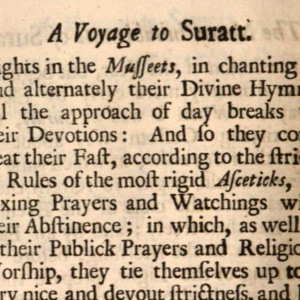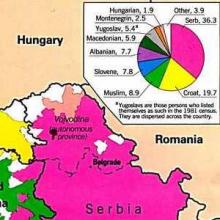Culture

Execution of a Pirate in Wapping, London
This print by Robert Dobb depicts a pirate being hanged at Execution Dock in Wapping, London's largest seafaring neighborhood.

Anstis Crew Mock Trial
This is a print taken from Captain Charles Johnson's 1724 book, A General History of the Robberies and Murders Of the most notorious Pyrates, depicting a mock trial held by the pirate crew of Captain Thomas Anstis.

Japanese Nanbanjin Folding Screen
This byobu, or folding screen, was created by Kano Naizen ca. 1593-1603.

Excerpt from "A Voyage to Surat in the Year 1689"
Ovington’s travelogue “The City of Surat and Its Inhabitants,” an excerpt from John Ovington’s A Voyage to Surat in the Year 1689 provides students with a European trader’s point of view as he confronts the world of Islam during the Mughal rule of India.

Vaulted Treasures: Historical Medical Books at the Claude Moore Health Sciences Library
This website features roughly 200 digitized pages drawn from more than 50 medical books published between 1493 and 1819. The website is structured as a virtual exhibit, presenting a separate page for each of 45 authors, including a brief biography of each.
The Story of Africa
Each segment provides a selection of quotes from primary sources that illuminate specific issues. There are many gems to mine. They range from original lyrical quotations that capture the imagination...to arresting images of initiation rituals and political power.
Perseus Digital Library
Perseus is a valuable resource for more general studies of history and historical methods both for the range of information it presents and for the tools it provides.
Trust Territory Photo Archives
The images in the collection are an extensive record of American views of Micronesian peoples, society, and culture and of the interaction between the United States and the Trust Territories.
Long Teaching Module: The Collapse of Yugoslavia
This case study examines the rewriting and reworking of Serbian national history that accompanied the breakup of Communist Yugoslavia, especially by intellectuals, and the role such groups played in reconstructing and resurrecting a distinct narrative of Serbia’s national history.
Source Collection: Songs of the Revolution
Music and singing were fundamentally important parts of the revolutionary experience. Amateurs and formally trained composers alike produced thousands of songs and hymns that celebrated or criticized the Revolution.